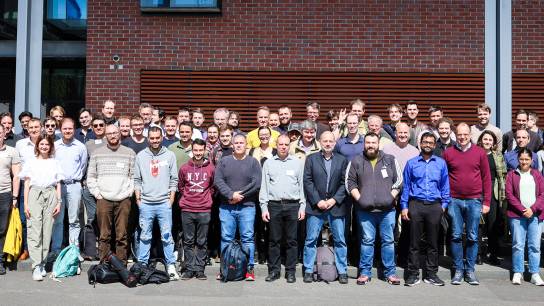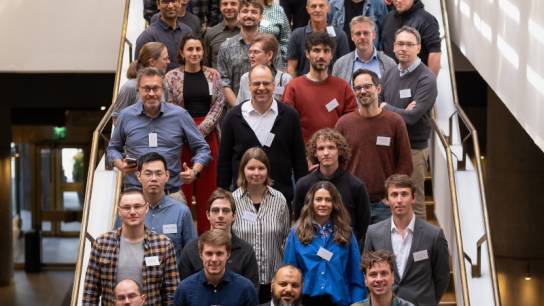Europe’s Quantum Ambitions Take Shape During OpenSuperQPlus Week
Helsinki/Online, May 2025 — The development of quantum computing is progressing steadily, with research institutions, companies, and policymakers across Europe working together to advance the field. This shared effort was clearly reflected in May, when members of the OpenSuperQPlus (OSQ+) consortium and key players from the European quantum community came together for an intensive week of meetings, workshops, and strategic discussions.
The closely connected events — the second OSQ+ Progress Meeting, a specialist workshop on optical integration, and the European Commission’s Quantum Cluster Review — highlighted both the scientific progress made so far and the importance of continued collaboration. They also demonstrated how research, industry, and policy are aligning to lay the foundations for a future European quantum infrastructure capable of delivering real technological benefits.
Aligning for Impact: The OpenSuperQPlus Progress Meeting
From 19 - 21 May, at the invitation of OSQ+ partners VTT and Aalto University, around 80 scientists, engineers, and industry partners gathered in Espoo-Helsinki for the annual project Progress Meeting. The three-day meeting offered more than just technical updates on the path from the interim goal of a scalable, 100-qubit quantum computer towards the next phase: OpenSuperQPlus1000. It served as a platform for critical reflection, coordination, and a shared commitment to Europe’s technological sovereignty in quantum computing.
Project coordinator Prof. Frank Wilhelm-Mauch (Forschungszentrum Jülich) opened the event by outlining the roadmap ahead and the significant challenges that lie along the way. His plenary talks set the tone for discussions focused on ensuring that all technical and strategic activities remain aligned with the project's overarching goal.
Throughout the meeting, partners tackled key questions: How can we ensure that hardware development, software benchmarks, and system integration all move forward in sync? How can Europe translate scientific excellence into practical, scalable quantum technologies?
The first day also featured insights from national initiatives, with Dr Pekka Pursula (VTT) presenting Finland's quantum research landscape, and Dr Vivek Sinha (TU Delft) introducing the open-architecture superconducting quantum computer hosted on the Quantum Inspire platform – a testament to Europe’s push for accessibility and transparency in quantum development.
From Technical Milestones to Ethical Reflections
The second day of the OSQ+ meeting saw a strong focus on integration and benchmarking – essential steps toward building usable quantum computers. Dr Paolo Bianco (Forschungszentrum Jülich) illustrated how complex supply chains are being coordinated across partners, while Prof. Zoltán Zimborás (Wigner RCP) presented a joint initiative with the OSQ+ sister project Millenion to define new performance benchmarks. The resulting Clifford Volume and Free Fermion Volume, due for publication later this year, promise to provide standardised tools for evaluating quantum computing progress.
But the meeting also addressed broader questions. In a world marked by geopolitical instability, the TU Delft team provoked reflection with a crucial question: Who should be allowed to use quantum computing resources, and for what purposes?
An engaging panel discussion followed, featuring voices from across the consortium, including Dr Mikael Johansson (CSC), Dr Klaus Liegener (WMI), and Dr Andreas Messner (Zurich Instruments). Ethical dilemmas, security concerns, and the need for responsible governance were openly debated – highlighting that quantum progress is not just a technical challenge but also a societal one.
The day concluded with a lecture from renowned guest speaker and OSQ+ scientific advisor Prof. Alexandre Blais (Université de Sherbrooke), who provided fresh scientific insights into measurement-induced ionisation in transmon qubits – a key aspect of quantum hardware development.
Optical Integration: Overcoming a Bottleneck in Cryogenic Quantum Technologies
Directly following the Progress Meeting, experts from across Europe convened for the Satellite Workshop on Optical Integration of Cryogenic Quantum Technologies on 21 - 22 May. Hosted in Helsinki by OSQ+ partner VTT with support from Zurich Instruments, the workshop addressed one of the major obstacles to scaling up quantum computers: the inefficient, heat-conducting microwave cabling currently used to connect systems operating at cryogenic temperatures.
Optical technologies could provide a breakthrough by enabling high-bandwidth, energy-efficient signal transfer between room-temperature electronics and cryogenic quantum processors. Invited speakers from leading companies and institutions – including OSQ+ coordinator Prof. Frank Wilhelm-Mauch from Forschungszentrum Jülich as well as experts from Physikalisch-Technische Bundesanstalt, QphoX, Polariton Technologies, ETH Zurich, Sorbonne Université and ISTA – presented advances in photonic interfaces, integrated optoelectronics, and quantum networking.
By bringing together researchers from academia, start-ups, and established industry players, the workshop fostered new collaborations and helped consolidate Europe’s efforts in this crucial field. Overcoming these technical bottlenecks is essential – not only for OSQ+ but for the scalability of quantum computers worldwide.
European Quantum Cluster Review: Progress and Perspective
The intense week culminated on 23 May with the Quantum Cluster Review, organised by the European Commission. Held online, this high-level event allowed quantum projects from across the EU – including OSQ+ – to present their progress, exchange experiences, and receive direct feedback from independent experts and EC representatives.
The message was clear: Europe’s quantum research is thriving – and accelerating. Reviewers highlighted scientific milestones in both hardware and software, the encouraging rise of quantum start-ups, and the importance of connecting research excellence to real-world applications.
At the same time, the review emphasised the need for balance: fostering open science while protecting intellectual property, expanding public awareness, and ensuring that Europe’s quantum efforts remain inclusive, transparent, and globally competitive.
A Collaborative Step Forward for Europe’s Quantum Future
These events together marked a defining moment for Europe’s quantum ambitions. From technical breakthroughs and strategic alignment to ethical reflection and community-building, the OSQ+ week underscored how far Europe has come – and how much still lies ahead.
As the field matures, the ultimate goal remains clear: to demonstrate quantum advantage, and to build a European quantum infrastructure that is world-class, scalable, and accessible.
By continuing to foster openness, cooperation, and scientific excellence, the European quantum community is well positioned to make significant contributions to this emerging field – not in competition, but as part of a global, collaborative effort to realise the potential of quantum technologies.

